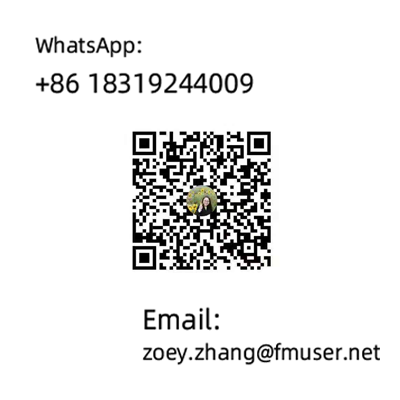Products Category
- FM Transmitter
- 0-50w 50w-1000w 2kw-10kw 10kw+
- TV Transmitter
- 0-50w 50-1kw 2kw-10kw
- FM Antenna
- TV Antenna
- Antenna Accessory
- Cable Connector Power Splitter Dummy Load
- RF Transistor
- Power Supply
- Audio Equipments
- DTV Front End Equipment
- Link System
- STL system Microwave Link system
- FM Radio
- Power Meter
- Other Products
- Special for Coronavirus
Products Tags
Fmuser Sites
- es.fmuser.net
- it.fmuser.net
- fr.fmuser.net
- de.fmuser.net
- af.fmuser.net ->Afrikaans
- sq.fmuser.net ->Albanian
- ar.fmuser.net ->Arabic
- hy.fmuser.net ->Armenian
- az.fmuser.net ->Azerbaijani
- eu.fmuser.net ->Basque
- be.fmuser.net ->Belarusian
- bg.fmuser.net ->Bulgarian
- ca.fmuser.net ->Catalan
- zh-CN.fmuser.net ->Chinese (Simplified)
- zh-TW.fmuser.net ->Chinese (Traditional)
- hr.fmuser.net ->Croatian
- cs.fmuser.net ->Czech
- da.fmuser.net ->Danish
- nl.fmuser.net ->Dutch
- et.fmuser.net ->Estonian
- tl.fmuser.net ->Filipino
- fi.fmuser.net ->Finnish
- fr.fmuser.net ->French
- gl.fmuser.net ->Galician
- ka.fmuser.net ->Georgian
- de.fmuser.net ->German
- el.fmuser.net ->Greek
- ht.fmuser.net ->Haitian Creole
- iw.fmuser.net ->Hebrew
- hi.fmuser.net ->Hindi
- hu.fmuser.net ->Hungarian
- is.fmuser.net ->Icelandic
- id.fmuser.net ->Indonesian
- ga.fmuser.net ->Irish
- it.fmuser.net ->Italian
- ja.fmuser.net ->Japanese
- ko.fmuser.net ->Korean
- lv.fmuser.net ->Latvian
- lt.fmuser.net ->Lithuanian
- mk.fmuser.net ->Macedonian
- ms.fmuser.net ->Malay
- mt.fmuser.net ->Maltese
- no.fmuser.net ->Norwegian
- fa.fmuser.net ->Persian
- pl.fmuser.net ->Polish
- pt.fmuser.net ->Portuguese
- ro.fmuser.net ->Romanian
- ru.fmuser.net ->Russian
- sr.fmuser.net ->Serbian
- sk.fmuser.net ->Slovak
- sl.fmuser.net ->Slovenian
- es.fmuser.net ->Spanish
- sw.fmuser.net ->Swahili
- sv.fmuser.net ->Swedish
- th.fmuser.net ->Thai
- tr.fmuser.net ->Turkish
- uk.fmuser.net ->Ukrainian
- ur.fmuser.net ->Urdu
- vi.fmuser.net ->Vietnamese
- cy.fmuser.net ->Welsh
- yi.fmuser.net ->Yiddish
Ham Radio Equipment and License
What is Ham Radio?
Being a Ham radio operator is more of a hobby than a profession, in fact one of the conditions of getting license for ham radio is that it cannot be used for commercial, professional and money making purposes. So it all boils down to a hobby, which needs a technical inclination. So whether you like phone operation, Morse code, slow scan TV, moon bounce, satellite communications or even repeater operation, there is a niche of Ham radio for everybody.Let's talk about ham radios got their names. Years ago, telegraph operators and not just any operators, but the exceptionally good ones were called 'hams' and this is how amateur radio operators got the name of ham radio operators. Initially hams had a main aim of building their own equipment and tweaking it to the most distance they could. Ham radio equipment building is another aspect of the ham radio hobby. So it put it simply, Amateur radios are ham radios. Ham radio operators are hobbyists who use the service of radio communications to communicate with each other for either public service, recreation purposes or self-training. Hams are very useful in emergency and disaster communications, especially when all means of communication like telephones are blocked.
Remember that just because hams are called amateur radio operators doesn't mean their skills are amateurish, it means that the communication via ham radios cannot be used for commercial or money making purposes.
Ham Radio License
To be a ham radio operator, you need to pass a licensing exam and acquire different level licenses. Ham radio or amateur radio is technical hobby and one that is encouraged by the US Federal Government. Hams come from every aspect of life, be it Doctors, Lawyers, Business executives or students; there is no specific age, caste, creed, color or gender for being a ham radio operator. These days getting started with ham radios has never been easier, no longer do you need to learn about Morse code to get your first ham license of the Technician Class. All you need to do is pass a 35 question multiple-choice question and you're a ham radio operator.There are three levels or classes in the United States of America, and these are granted or issued by the Federal Communications Commission. These classes of license are:
- Technician Class: The technician class license is specifically designed for beginners in ham radio. This license allows these operators to have ten-meter voice privilege along with CW on 80, 40, 15 and 10 meters. It also authorizes ham radio users a privilege of above 30 MHz. Technician class hams can operate FM service, computers, TV and other modes as well. Being a Technician class ham also allows you to make international radio contacts through Ham radio satellites. To get a technician class license requires you to give an entry-level test which is a written exam designed keeping a beginner in mind.
- General Class Ham License: This is the second level and also the most popular. This gives you all the privileges on all ham bands.
- Extra Class: This is considered to be the most advanced level of ham license. This license give you access to all ham bands and ham radio frequencies.
Ham Radio Equipment
A typical and common ham radio is a basic transmitter and a receiver; this can be purchased as one unit that is called the transceiver. These days there are newer transceiver models that may seem a bit complicated with controls and menu systems that will take a little understanding (and reading of the manual). If you are a beginner at hams, it is best if you get older equipment as it is simple and easy to use and they have the basic analog controls. Handheld transceivers will have their own antennas to catch frequencies. If you are using your ham while traveling, then a magnetic mount antenna is connected to an under-dash transceiver or to a handheld transceiver. The power output depends on the size of the equipment, handheld or desktop. The power can be anything from 10 milli watts to 1500 watts.





